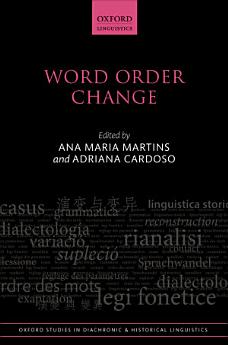Word Order Change
Ana Maria Martins · Adriana Cardoso
Juni 2018 · Oxford Studies in Diachronic and Historical Linguistics Buch 29 · Oxford University Press
E-Book
336
Seiten
family_home
Zulässig
info
reportBewertungen und Rezensionen werden nicht geprüft Weitere Informationen
Über dieses E-Book
This volume explores word order change within the framework of diachronic generative syntax. Word order is at the core of natural language grammatical systems, linking syntax with prosody and with semantics and pragmatics. The chapters in this volume use the tools provided by the generative theory of grammar to examine the constrained ways in which historical word order variants have given way to new ones over time. Following an introduction by the editors, the book is divided into four parts that investigate changes regarding the targets for movement within the clausal functional hierarchy; changes (or stability) in the nature of the triggers for movement; verb movement into the left peripheries; and types of movement, with specific focus on word order change in Latin. Data are drawn from a wide variety of languages from different families and from both classical and modern periods, including Sanskrit, Tocharian, Italian, Portuguese, Dutch, Irish, Hungarian, and Coptic Egyptian. The book's broad coverage and combination of language-internal and comparative studies offers new perspectives on the relation between word order change and syntactic movement. The volume also provides a range of wider insights into the properties of natural language and the way in which those properties constrain language variation and change.
Autoren-Profil
Ana Maria Martins is Professor at the School of Arts and Humanities at the University of Lisbon. Her research in comparative syntax and historical syntax covers topics such as word order, clitics, negation, emphatic polarity, infinitival structures, and passive and impersonal constructions. She has directed projects resulting in parsed corpora for the study of the syntax of European Portuguese dialects (CORDIAL-SIN) and the syntax of Old Portuguese (WOChWEL). She has published articles in journals such as Lingua, Natural Language and Linguistic Theory, and Linguistic Inquiry, and is the editor of Manual de Linguística Portuguesa (De Gruyter, 2016) and co-editor of the journal Estudos de Lingüística Galega. Adriana Cardoso is Assistant Professor at the Higher Education College of Lisbon (ESELx) and researcher at the Linguistics Centre of the University of Lisbon (CLUL). Her main research interests are historical linguistics, comparative syntax, and educational linguistics. She was recently involved in the WOChWEL project (Word Order and Word Order Change in Western European Languages), sponsored by the Portuguese National Science Agency. Her book Portuguese Relative Clauses in Synchrony and Diachrony was published in 2017 by OUP.
Dieses E-Book bewerten
Deine Meinung ist gefragt!
Informationen zum Lesen
Smartphones und Tablets
Nachdem du die Google Play Bücher App für Android und iPad/iPhone installiert hast, wird diese automatisch mit deinem Konto synchronisiert, sodass du auch unterwegs online und offline lesen kannst.
Laptops und Computer
Im Webbrowser auf deinem Computer kannst du dir Hörbucher anhören, die du bei Google Play gekauft hast.
E-Reader und andere Geräte
Wenn du Bücher auf E-Ink-Geräten lesen möchtest, beispielsweise auf einem Kobo eReader, lade eine Datei herunter und übertrage sie auf dein Gerät. Eine ausführliche Anleitung zum Übertragen der Dateien auf unterstützte E-Reader findest du in der Hilfe.








